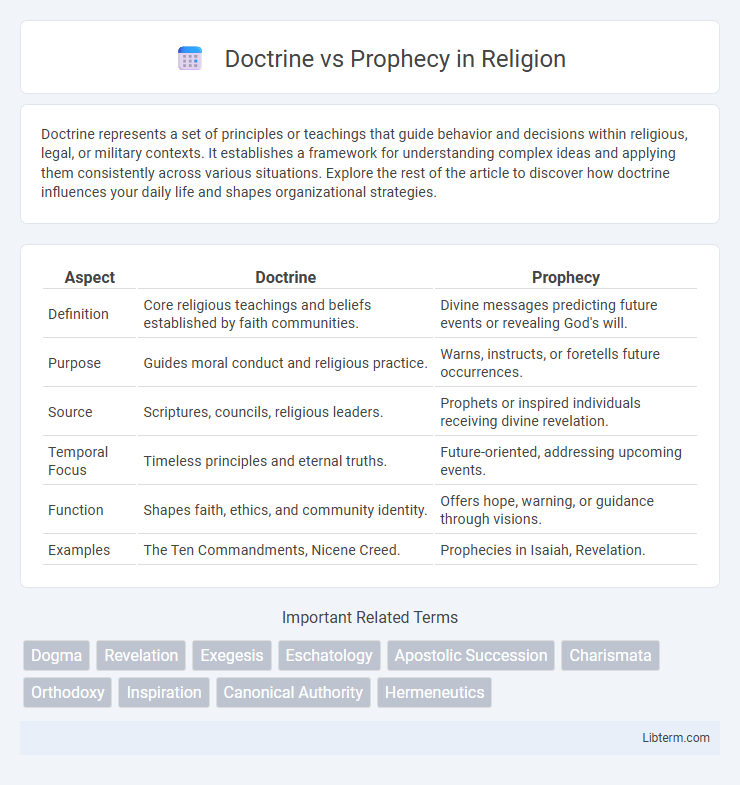Doctrine represents a set of principles or teachings that guide behavior and decisions within religious, legal, or military contexts. It establishes a framework for understanding complex ideas and applying them consistently across various situations. Explore the rest of the article to discover how doctrine influences your daily life and shapes organizational strategies.
Table of Comparison
| Aspect | Doctrine | Prophecy |
|---|---|---|
| Definition | Core religious teachings and beliefs established by faith communities. | Divine messages predicting future events or revealing God's will. |
| Purpose | Guides moral conduct and religious practice. | Warns, instructs, or foretells future occurrences. |
| Source | Scriptures, councils, religious leaders. | Prophets or inspired individuals receiving divine revelation. |
| Temporal Focus | Timeless principles and eternal truths. | Future-oriented, addressing upcoming events. |
| Function | Shapes faith, ethics, and community identity. | Offers hope, warning, or guidance through visions. |
| Examples | The Ten Commandments, Nicene Creed. | Prophecies in Isaiah, Revelation. |
Understanding Doctrine: Foundations and Functions
Doctrine serves as a structured system of beliefs and teachings that underpin religious faith, guiding moral principles and spiritual practices. It functions as a foundational framework that shapes communal identity, informs ethical behavior, and ensures consistency in worship and ritual observance. Understanding doctrine involves examining its historical development, scriptural basis, and interpretative traditions within specific religious contexts.
Defining Prophecy: Meaning and Manifestations
Prophecy refers to the practice of predicting future events or revealing hidden knowledge through divine inspiration or supernatural insight. Manifestations of prophecy often include visions, dreams, or oral proclamations believed to convey messages from a higher power or spiritual source. In literary and religious contexts, prophecy serves as a key element for guiding moral behavior, shaping beliefs, and interpreting historical occurrences.
Doctrine vs Prophecy: Core Differences
Doctrine and Prophecy differ fundamentally in purpose and function; Doctrine consists of established teachings and principles that guide faith and practice, while Prophecy involves receiving and delivering messages believed to be inspired by a divine source. Doctrine provides a stable framework for belief systems, often codified in religious texts, whereas Prophecy is dynamic, frequently addressing current or future events to inspire, warn, or encourage believers. The core difference lies in Doctrine's authoritative and consistent nature versus Prophecy's spontaneous and revelatory character.
Historical Perspectives on Doctrine and Prophecy
Historical perspectives on doctrine and prophecy reveal distinct roles in shaping religious traditions and beliefs. Doctrine, often formalized through councils and creeds, provided a systematic foundation for theological teachings, ensuring uniformity and continuity across generations. Prophecy, characterized by visionary messages and revelations, contributed dynamic and sometimes transformative insights that challenged existing beliefs and inspired spiritual renewal.
Authority Sources: Doctrinal Teachings vs Prophetic Messages
Doctrinal teachings derive authority from established religious texts, councils, and historical interpretations, providing a structured framework for faith practice and belief systems. Prophetic messages claim authority through direct divine revelation, offering guidance that can challenge or complement established doctrines with timely, often urgent, insights. The tension between doctrinal authority and prophetic revelation shapes religious communities by balancing tradition with dynamic spiritual experiences.
Roles in Faith Communities: Doctrine and Prophecy
Doctrine serves as the foundational set of beliefs and teachings that guide faith communities by providing structure and consistency in interpreting scriptures and moral principles. Prophecy functions as a dynamic and spiritual expression within these communities, offering timely guidance, encouragement, and insight perceived as divinely inspired messages. Together, doctrine ensures theological stability while prophecy fosters ongoing spiritual renewal and responsiveness to contemporary challenges.
Interpreting Doctrine and Prophecy: Methods and Challenges
Interpreting doctrine requires analyzing established religious teachings through historical, cultural, and theological contexts to preserve their intended meaning and application. Prophecy interpretation involves deciphering symbolic language, predicting future events, and understanding divine messages, often complicated by ambiguous or metaphorical expressions. Both methods face challenges such as subjective biases, evolving interpretations, and reconciling ancient texts with contemporary beliefs.
Theological Implications: Doctrine versus Prophecy
Doctrine establishes foundational theological truths that guide Christian faith and practice, ensuring continuity and orthodoxy through creeds and confessions. Prophecy serves as a dynamic revelation from God, often addressing specific situations, calling for repentance, or foretelling future events, which can challenge or deepen understanding of doctrine. The interplay between doctrine and prophecy shapes the development of theology by balancing settled truths with ongoing divine communication.
Modern Relevance: Doctrine and Prophecy Today
Doctrine remains foundational in shaping contemporary religious beliefs, providing structured principles that guide faith communities worldwide. Prophecy continues to hold significant influence in modern spirituality, often viewed as a dynamic expression of divine communication and personal insight. Together, doctrine and prophecy interact to maintain theological relevance and adapt to evolving cultural contexts in today's religious landscape.
Balancing Doctrine and Prophecy in Spiritual Life
Balancing Doctrine and Prophecy in spiritual life requires integrating established theological teachings with the dynamic, Spirit-led insights that prophecy offers. Doctrine provides a stable framework grounded in Scripture and tradition, ensuring consistency and soundness in faith, while prophecy brings timely encouragement, guidance, and correction relevant to individual and communal needs. Effective spiritual growth emerges from harmonizing these elements, allowing prophetic revelations to be tested and affirmed by doctrinal truths to maintain both spiritual vitality and theological integrity.
Doctrine Infographic

 libterm.com
libterm.com